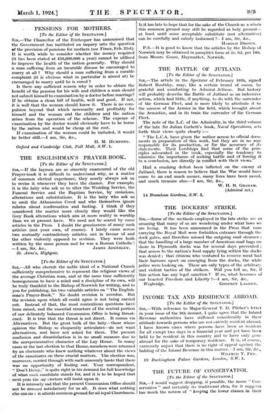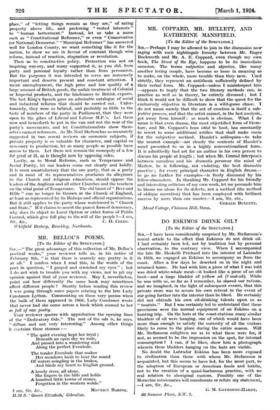THE FUTURE OF CONSERVATISM.
[To the Editor of the SPECTATOR.]
SIR,—I would 'suggest dropping, if possible, the name " Con- servative " and certainly its traditional idea, for it suggests too much the notion of " keeping the lower classes in their
place," of "letting things remain as they are," of rating property above life, and preferring " vested interests " to " human betterment." Instead, let us take a name such as " Constitutional Reformer," or even " Conservative (or National) Democrat." "Municipal Reformer" has answered well for London County, we want something like it for the nation, to show we are in favour of constant though wise reform, instead of reaction, stagnation or revolution.
Then as to constructive policy. Protection was not an inspiring war-cry, and many supported it, as you did, from party and personal loyalty rather than from persuasion. But the purposes it was intended to serve are immensely important and deserve present and constant attention. I mean unemployment, the high price and low quality of a large amount of British goods, the unfair treatment of Colonial or Imperial products, and the hindrances to British exports. The last King's Speech gave an admirable catalogue of social and industrial reforms that should be carried out. Unfor- tunately, they were so belated, and probably so little to the taste of numbers of the party in Parliament, that they were open to the gibes of Liberal and Labour M.P.'s. Let them now and henceforth be put in the van and not the rear of the party's movements, and let Constitutionalists show them- selves earnest reformers. As Mr. Noel Skelton has so accurately suggested in two recent reviews on economic subjects, if private property is so valuable for character, and capital so necessary to production, let as many people as possible have access to them. Let them not remain the monopoly of a few for good or ill, as is thought now by opposing sides.
Lastly, as to Moral Reforms, such as Temperance and Social Purity, let our leaders come out clearly and boldly. It is most unsatisfactory that the one party, that as a party and in most of its representatives proclaims its allegiance to the Church and religious education, should oppose the leaders of the Anglican and all other Churches and the teachers on the vital point of Temperance. The old taunt of " Beer and Bible " can no longer be thrown at the Church of England, at least as represented by its Bishops and official organizations. But it still applies to the party whose watchword is " Church and State." If it claims to assert the purest form of democracy, why does its object to Local Option or other forms of Public Control, which give full play to the will of the people ?—I am,











































 Previous page
Previous page